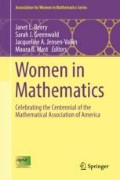Abstract
The EDGE Program (Enhancing Diversity in Graduate Education) was initiated in 1998 by two mathematics professors from women’s colleges, with the goal of helping women persist in graduate programs in the mathematical sciences. The program initially focused on the transition to and preparation for the first year of graduate school, with a commitment to diversity among participants, faculty, and staff. A four-week summer session featured courses that bridge undergraduate and graduate work, study groups, graduate student mentors, and professional and academic visitors, as well as social and team-building activities. Gradually EDGE expanded to support women throughout their graduate school and professional careers. What began with two founders and eight EDGE participants has grown to a diverse community of alumnae, more than 48% of whom are from groups underrepresented in the mathematical sciences. This article chronicles the impact of the EDGE Program on participants and the emergence of a new generation of leaders in the mathematics community. Lessons learned that may benefit others involved in related efforts are shared.
Sylvia Bozeman and Rhonda Hughes are the EDGE Co-Founders. Susan D’Agostino is the first EDGE participant to have earned the Ph.D. in mathematics.
Notes
- 1.
This program was also called the Spelman-Bryn Mawr Summer Mathematics Program for two years.
- 2.
The phrase “subsequent summer sessions” refers to subsequent years other than 2007, a year when there was no summer session and no new participants.
References
Annual Estimates of the Resident Population by Sex Age, Race and Hispanic Origin for the United States, States, and Counties: April 1, 2010 to July 1, 2014. American FactFinder. U.S. Census Bureau, Population Division. http://factfinder.census.gov/faces/tableservices/jsf/pages/productview.xhtml?src=bkmk. Accessed 29 October 2016.
Bozeman, Sylvia T. 1989. Black Women Mathematicians: In Short Supply. SAGE, A Scholarly Journal on Black Women 6(2) (Fall): 18–23.
Bozeman, Sylvia T., Rhonda J. Hughes, and Carol J. Auster. EDGE Ph.D. Survey Results. Survey conducted in 2012. Unpublished.
EDGE Ph.D.s. 2016. The EDGE Program. http://www.edgeforwomen.org/edge-phds/. Accessed 29 October 2016.
Falconer, Etta Z. 1997. The Challenge of Diversity. In African Americans in Mathematics, ed. Nathaniel Dean, 169–182. DIMACS Series in Discrete Mathematics and Theoretical Computer Science 34:16. Providence: American Mathematical Society.
Gender, Race/Ethnicity, and Citizenship of New Doctoral Recipients by Group. Annual Survey of the Mathematical Sciences. Doctorates Granted in 2006, 2007, 2008, 2009, and 2010. American Mathematical Society. http://www.ams.org/profession/data/annual-survey/docsgrtd. Accessed 29 October 2016.
Kirkman, Ellen E., and Olivia A. Scriven. 2008. Promoting Diversity at the Graduate Level in Mathematics, Proceedings of a National Forum, 15–17 October. Berkeley, CA: Mathematical Sciences Research Institute. http://library.msri.org/msri/DiversGradMath.pdf. Accessed 21 October 2016.
Mathematics Programs That Make a Difference. 2007. Notices of the American Mathematical Society 54(5) (May): 634–636.
Vélez, William Yslas, James W. Maxwell, and Colleen Rose. 2014. Report on the 2013–2014 New Doctoral Recipients, Supplemental Table D.5. 2014 Annual Survey of the Mathematical Sciences. American Mathematical Society. http://www.ams.org/profession/data/annual-survey/2014Survey-SREC.pdf. Accessed 29 October 2016.
Widnall, Sheila E. 1988. AAAS Presidential Lecture: Voices from the Pipeline. Science 241(4874) (30 September): 1743. doi:10.1126/science.241.4874.1740.
Women, Minorities, and Persons with Disabilities in Science and Engineering. TABLE 5-1. Bachelor’s degrees awarded, by sex and field: 2004–14. 2015. NSF 15–311 (January). Arlington, VA: National Science Foundation. https://www.nsf.gov/statistics/2015/nsf15311/tables.cfm. Accessed 29 October 2016.
Acknowledgments.
We owe a debt of gratitude that we can never pay to so many people who helped to lay a foundation for the EDGE Program, beginning with the two program officers, Lloyd Douglas at NSF and Danielle Carr at the Mellon Foundation, who were early and steadfast champions of the EDGE Program and insured its support and ultimate success. In addition, we owe deep gratitude to our first Program Coordinator, the creative and energetic Diana Dismus Campbell, who worked out of her home for years bringing professionalism and flair to our “mom and mom” operation. She was followed by Linda Pace, who deftly guided us through a period of growth and transition. Deep thanks also to Carol Auster for her years of careful evaluation and her work with the EDGE PhD Survey. We owe much of the visibility and connectedness to Ann Dixon who maintains the www.edgeforwomen.org website and facilitates other modes of communication.
We thank the many faculty and graduate mentors who we do not have space to identify by name. We express sincere appreciation to Ami Radunskaya and Ulrica Wilson who accepted the leading roles as co-directors when the founding directors retired. Finally, we thank all of the EDGE alumnae who continue to inspire us every day.
Author information
Authors and Affiliations
Corresponding author
Editor information
Editors and Affiliations
Rights and permissions
Copyright information
© 2017 The Author(s) and the Association for Women in Mathematics
About this chapter
Cite this chapter
Bozeman, S.T., D’Agostino, S., Hughes, R.J. (2017). An EDGE in Mathematics for Women: The Enhancing Diversity in Graduate Education Program. In: Beery, J., Greenwald, S., Jensen-Vallin, J., Mast, M. (eds) Women in Mathematics. Association for Women in Mathematics Series, vol 10. Springer, Cham. https://doi.org/10.1007/978-3-319-66694-5_20
Download citation
DOI: https://doi.org/10.1007/978-3-319-66694-5_20
Published:
Publisher Name: Springer, Cham
Print ISBN: 978-3-319-66693-8
Online ISBN: 978-3-319-66694-5
eBook Packages: Mathematics and StatisticsMathematics and Statistics (R0)

